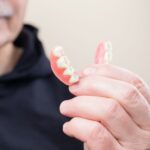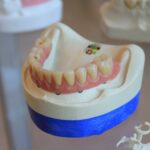Are you ready to step into the future of denture technology? In this article, we will dive into the mesmerizing world of the latest advancements that are revolutionizing the field. From groundbreaking techniques to innovative materials, the world of denture technology is evolving at an astonishing pace. Whether you are a dental professional staying on top of the game or someone who values the importance of a confident smile, this captivating journey will unveil the cutting-edge developments that are reshaping the way we think about dentures. Get ready to be amazed as we explore the forefront of denture innovation!

Latest Advancements in Denture Technology
The field of denture technology has witnessed remarkable advancements in recent years, revolutionizing the way dentures are designed, fabricated, and fitted. These developments have not only improved the overall quality and functionality of dentures but have also enhanced the patient’s comfort and confidence. In this article, we will explore the latest advancements in denture technology, uncovering the cutting-edge techniques, materials, and innovations that are shaping the future of denture care.
Advancement 1: Digital Dentistry – Precision at Your Fingertips
One of the most significant advancements in denture technology is the integration of digital dentistry. Gone are the days of traditional manual impressions and extensive laboratory work. With the advent of intraoral scanners and computer-aided design and manufacturing (CAD/CAM) systems, denture fabrication has become faster, more accurate, and more comfortable for patients.
Using digital scanners, dentists can capture detailed images of the patient’s oral cavity, eliminating the need for messy and uncomfortable impression materials. These digital impressions are then fed into specialized software, where dentures can be designed virtually. The precision of digital dentistry allows for a better fit, improved aesthetics, and optimal functionality.
Quote: The integration of digital dentistry has transformed denture fabrication, ensuring precision at every step – from capturing impressions to the final fitting.
Advancement 2: Materials Breakthrough – Natural-Looking and Durable Dentures
Traditionally, dentures were primarily made from acrylic, which often lacked the natural appearance and durability desired by patients. However, with the latest advancements in materials, denture options have significantly improved.
One breakthrough material is flexible resin, which offers a more comfortable fit and increased durability. Flexible dentures can adapt to the contours of the mouth, minimizing sore spots and enhancing patient comfort. These dentures also feature a more natural appearance, closely resembling the look and feel of natural teeth.
Another exciting development is the use of high-strength ceramics, such as zirconia, in denture frameworks. These materials combine strength, durability, and aesthetics, resulting in dentures that are not only long-lasting but also highly esthetic. Patients can now enjoy dentures that are both functional and visually appealing, improving their overall quality of life.
Quote: The latest materials breakthroughs in denture technology have addressed the longstanding issues of comfort, aesthetics, and durability, providing patients with dentures that look and feel as close to natural teeth as possible.
Advancement 3: Implant-Supported Dentures – Enhanced Stability and Chewing Efficiency
Implant-supported dentures have revolutionized the world of dentures, offering enhanced stability, chewing efficiency, and overall comfort. With the use of dental implants, the dentures are firmly anchored to the jawbone, eliminating the need for adhesives and reducing the risk of slippage or dislodgement.
The introduction of mini dental implants has taken implant-supported dentures to the next level. Mini implants are smaller in diameter than traditional implants, making them suitable for patients with limited bone volume or those seeking a less invasive treatment option. These mini implants provide a reliable foundation for dentures, allowing patients to enjoy increased biting force and improved speech.
Quote: Implant-supported dentures have transformed the lives of denture wearers, offering unparalleled stability, increased chewing efficiency, and enhanced comfort.
Advancement 4: 3D Printing – Customization and Efficiency
Another groundbreaking advancement in denture technology is the utilization of 3D printing. This technology allows for the efficient and precise fabrication of dentures, custom-tailored to each patient’s unique oral structure.
With 3D printing, denture bases and frameworks can be produced in a fraction of the time compared to traditional manufacturing methods. This streamlined process improves efficiency, reduces human error, and enhances overall patient experience. Furthermore, 3D printing enables the incorporation of intricate designs and textures, resulting in dentures that are both functional and aesthetically pleasing.
Quote: The advent of 3D printing has revolutionized denture fabrication, offering customization, efficiency, and improved patient experiences.
Advancement 5: Smart Dentures – Innovations for Optimal Oral Health
The latest advancements in denture technology extend beyond the mere aesthetic and functional aspects. Innovations have been made to promote optimal oral health and improve the overall well-being of denture wearers.
Smart dentures, equipped with embedded sensors, enable real-time monitoring of oral health parameters such as temperature, pH balance, and pressure. These sensors can detect issues such as poor oral hygiene practices or excessive force during chewing, helping patients maintain good oral health and prevent potential complications.
Quote: Smart dentures represent the future of denture care, empowering patients to actively monitor their oral health for improved well-being.
In conclusion, the latest advancements in denture technology have transformed the landscape of denture care, providing patients with superior comfort, enhanced aesthetics, and improved functionality. From digital dentistry and materials breakthroughs to implant-supported dentures, 3D printing, and smart dentures, these innovations have revolutionized the field, ensuring a brighter future for denture wearers.
So, if you’re considering dentures or currently wearing them, it’s worthwhile to explore these latest advancements and consult with your dentist about how they can benefit you. Embrace the future of denture technology and enjoy a confident smile that feels and functions just like natural teeth.
Quote: Stay informed about the latest advancements in denture technology to make the most informed decisions about your dental health and overall well-being.
Dentures have been used for centuries to help people restore their smile and regain the ability to chew and speak properly. But did you know that dentures have a fascinating history? If you’re curious to learn more about the interesting facts surrounding dentures, click here: interesting facts about dentures. From ancient civilizations creating dentures out of animal teeth to modern advancements in denture technology, exploring the world of dentures will surely leave you amazed. So why wait? Discover the captivating world of dentures by clicking the link above. And who knows, you might just uncover some surprising information that will make you appreciate dentures even more.
FAQ
Q: What are the latest advancements in denture technology?
A: The latest advancements in denture technology include the use of digital scanning and 3D printing to create more precise and comfortable dentures. Additionally, researchers are exploring the use of specialized materials, such as flexible resins and bioactive polymers, to improve the durability and aesthetics of dentures.
Q: How does digital scanning improve the creation of dentures?
A: Digital scanning allows for a more accurate and efficient process of capturing a patient’s oral anatomy. This technology eliminates the need for traditional putty impressions and provides dentists with a digital model that can be used to design and fabricate custom dentures with greater precision.
Q: What is 3D printing and how is it used in denture fabrication?
A: 3D printing, also known as additive manufacturing, involves building a three-dimensional object layer by layer. In denture fabrication, 3D printing allows for the production of dentures using computer-generated designs. This technology offers benefits such as faster turnaround times, increased customization options, and improved fit and comfort of the dentures.
Q: What are flexible resins and how do they enhance dentures?
A: Flexible resins are a type of material used in denture fabrication that offers increased flexibility and durability compared to traditional acrylic materials. These resins can improve the comfort and fit of dentures, reducing the risk of discomfort and sore spots often associated with rigid acrylic dentures.
Q: What are bioactive polymers and how do they benefit denture wearers?
A: Bioactive polymers are materials that have the ability to interact with the oral environment, promoting oral health and improving denture performance. These polymers can release beneficial substances, such as antimicrobial agents or remineralizing ions, to reduce the risk of oral infections and provide a better overall oral environment for denture wearers.
- Georgia Platform: A Southern Strategy, 1850s - March 31, 2025
- How many weeks is 40 days: Quick Conversion Guide for Accurate Results - March 31, 2025
- How many feet is 300 meters? 984 Feet: Understand Length Conversions Easily - March 31, 2025
















